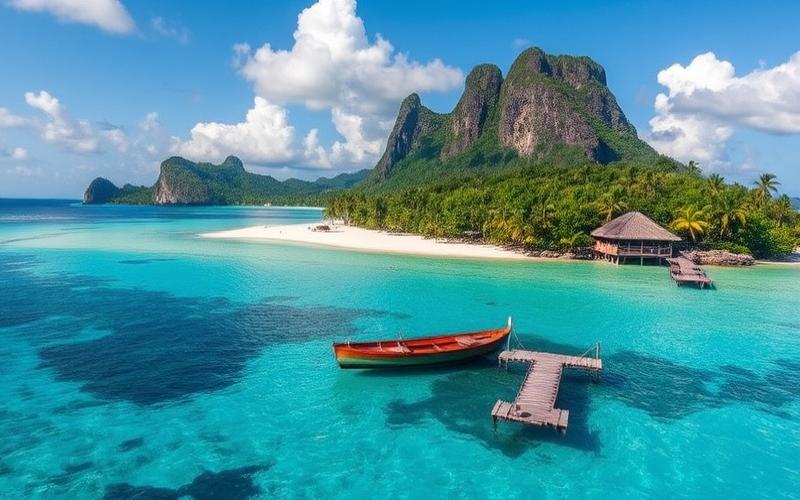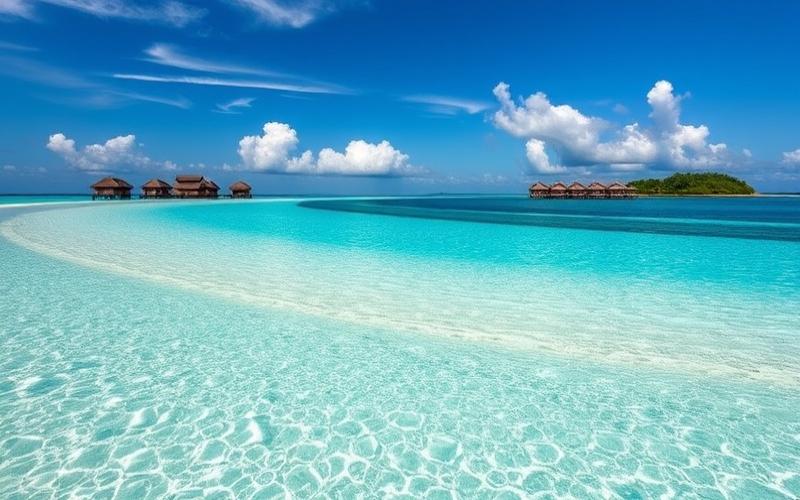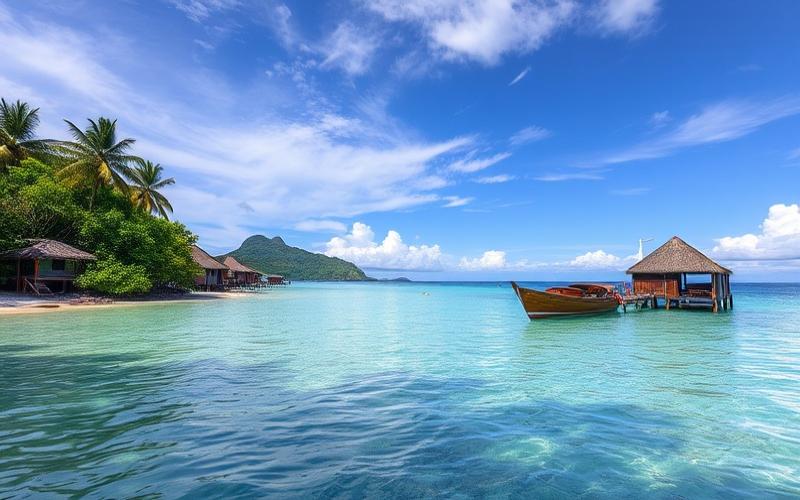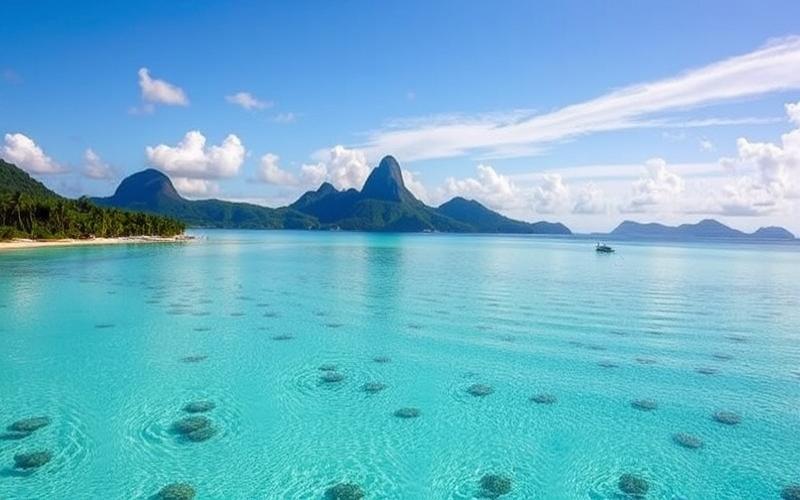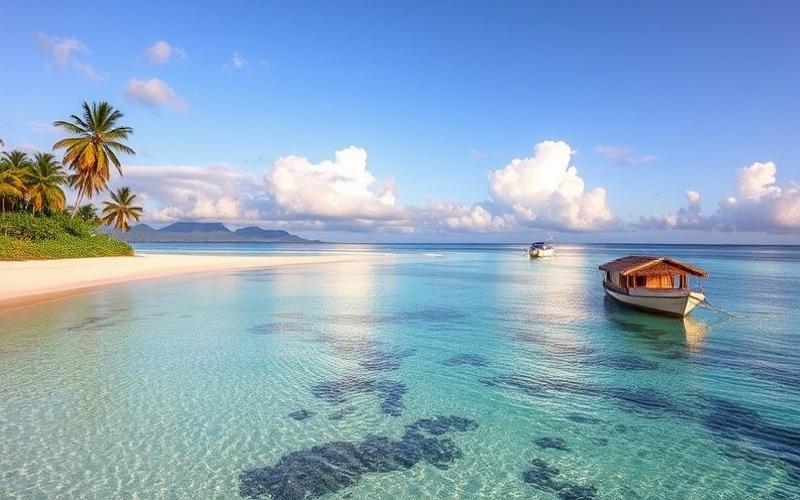
 Published on and written by Cyril Jarnias
Published on and written by Cyril Jarnias
Dark Stores: A New Real Estate Trend in Seychelles
In the idyllic Seychelles archipelago, renowned for its paradise beaches and exceptional biodiversity, a new phenomenon is beginning to permeate the real estate market: dark stores.
These urban warehouses, optimized to facilitate ultra-fast deliveries, are disrupting not only the commercial landscape but also traditional purchasing and logistics dynamics.
While some perceive them as an attractive investment opportunity, others worry about their potential impact on the environment and local quality of life.
Let’s dive into this intriguing world to understand how these new players are redefining the Seychellois real estate market.
Urban Warehouses for Fast Delivery in Seychelles
Urban warehouses for fast delivery are experiencing sustained development in Seychelles, aligning with the global trend of dark stores. These logistics facilities, typically located near or within urban centers, serve as storage and shipping points to accelerate last-mile delivery. Their emergence responds to the growth of online commerce and the need to provide a high-performing omnichannel shopping experience.
Role in the Dark Store Phenomenon
- Urban warehouses function as dark stores, meaning they are closed to the public but entirely dedicated to the rapid preparation of online orders.
- They enable express shipping (often within 24 hours) as well as services like in-store pickup or merchandise returns.
- The logistics optimization provided by these spaces reduces transportation costs and improves last-mile efficiency.
Impact on the Local Real Estate Market
| Opportunities | Challenges |
|---|---|
| Creation of specialized jobs | Potential increase in commercial rents |
| Revitalization of vacant or underutilized premises | Increased land pressure in urban areas |
| Stimulation of the local economic fabric | Potential nuisances (traffic, noise) |
- Warehouses revitalize certain neighborhoods by repurposing former stores or industrial spaces for their operations.
- However, their establishment can also lead to an increase in commercial real estate prices and generate heightened competition with traditional businesses.
Specific Data: Location, Size, Operation
Location
- These mini-warehouses are primarily installed near major roadways and close to densely populated areas to optimize routes.
- In Seychelles, they are concentrated around Victoria and in certain peripheral industrial zones to quickly serve all of Mahé.
Size
The area varies according to local demand: some micro-hubs are less than 500 m² while others exceed 1,000 m².
Operation
- Daily/synchronous reception with e-commerce flows
- Optimized temporary storage thanks to a flexible system adapted to rapid turnover
- Automated/assisted preparation via advanced digital technologies
- Delivery ensured by local eco-friendly fleets
Companies Involved
Several international logistics players are integrating this model:
Non-exhaustive list:
- Urbangoo already offers its micro-warehouse solutions adapted to island contexts like Seychelles
- Specialized companies such as Stuart also provide a logistics network dedicated to express food distribution via these hubs
Urban Integration & Regulatory Measures
Harmonious integration involves:
- Close consultation with local authorities to judiciously choose locations (limiting heavy traffic)
- Gradual adoption of environmental standards aiming particularly for a decarbonized fleet
Specific regulations are emerging to:
- Strictly regulate hours/reverse logistics to limit nighttime nuisances,
- Prioritize land reuse over new land development,
- Impose transparency on processed volumes and ecological traceability.
Urban warehouses now constitute an essential pillar to effectively meet growing expectations for speed and logistics flexibility while nevertheless posing several urban planning challenges that must be addressed with appropriate regulations.
Good to Know:
In Seychelles, the development of urban warehouses for fast delivery, known as dark stores, is booming, responding to growing demand for convenience and speed. These facilities, often strategically located in Mahé and Praslin, vary in size but are generally small-scale to integrate into the urban fabric without disrupting local aesthetics. Companies such as ZipBiz and QuickDrop are at the forefront of this phenomenon, operating optimized spaces for the storage and rapid preparation of online orders. However, while these warehouses offer economic opportunities, particularly in stimulating the job market, they also pose challenges for the real estate market by exerting pressure on commercial space availability. Local authorities have implemented restrictions on the location and size of dark stores to ensure they comply with the archipelago’s specific environmental and architectural standards.
The Expansion of Dark Stores and Their Real Estate Implications
The rapid rise of dark stores is profoundly transforming the real estate market in Seychelles, marking a notable transition from traditional commercial space usage to facilities exclusively dedicated to storage and online order management.
Transformation of Real Estate Use
- Premises previously reserved for direct sales (shops, convenience stores) are being repurposed to accommodate only storage and logistics.
- This conversion occurs mainly in dense urban areas where demand for ultra-fast delivery justifies the strategic placement of dark stores.
- Former storefronts lose their classic commercial purpose and transform into hubs invisible to the public but essential to the modern supply chain.
Specific Examples of Real Estate Evolution
| Use Before Dark Store | Use After Transformation |
|---|---|
| Grocery Store | Q-Commerce Logistics Center |
| Appliance Store | E-commerce Dedicated Micro-Warehouse |
| Multipurpose Space | Order Preparation Platform |
In some historically vibrant shopping districts, a gradual replacement of storefronts with discreet access reserved for delivery personnel or employees is observed. This alters the urban landscape, sometimes reducing pedestrian activity on certain thoroughfares.
Impacts on Real Estate Prices
- Commercial: Demand for prime locations slightly decreases for classic retail but significantly increases for properties easily convertible into logistics centers. This creates new valuation around criteria like road access or capacity to handle large flows rather than visual appeal or foot traffic.
- Residential: The massive arrival of logistics activities can locally lead to stagnation or even a temporary drop in residential prices if it generates nuisances (noise, traffic). Conversely, it maintains or even revitalizes some areas previously commercially neglected thanks to a new economic use.
Advantages and Disadvantages According to Stakeholders
Property Owners
- Advantages: Possibility to quickly re-lease vacant former stores; stable rents from the B2B sector (logistics providers).
- Disadvantages: Reduced long-term attractiveness if the neighborhood loses its traditional commercial vibrancy; potential need for major renovations to adapt the premises.
Investors
- Advantages: Potentially high returns in an unsaturated rental market; diversification against risks related to classic retail.
- Disadvantages: Increased exposure to rapid e-commerce developments; dependence on often international players who can quickly reconfigure their needs.
Tenants
- Advantages: Easier access to suitable spaces without the need for storefronts or costly public-oriented amenities.
- Disadvantages: Increased regulatory risk concerning permitted actual use or cohabitation with nearby residential zones; uncertainty about contract longevity if the business model changes.
Urban Planning and Territorial Consequences
- Increase in utility traffic around logistics hubs
- Necessary adaptation of local roadways
- Possible increased congestion during peak hours
Modification of the Urban Fabric:
- Gradual reduction of visible commerce in certain streets
- Occasional appearance of “gray zones” with low attractiveness outside business hours
Future Need for Specific Regulatory Framework by Seychellois Authorities to:
- Preserve urban diversity,
- Avoid commercial desertification,
- Guarantee environmental quality around new logistics poles
Good to Know:
In Seychelles, the expansion of dark stores is gradually transforming the commercial and residential real estate landscape. Traditionally, the islands’ commercial spaces, often located in strategic areas, are being converted into facilities for storage and online order processing. This reassignment increases demand for storage-adapted premises, causing a rise in commercial real estate prices. Paradoxically, this demand could devalue adjacent residential properties due to increased traffic and changes in local usage. For property owners, this boom offers lucrative opportunities in commercial leasing, while for investors, it involves rethinking their portfolios by incorporating properties suited to this growing use. However, tenants may face higher rents and an environment altered by the increased development of this urban logistics. Finally, the establishment of dark stores raises challenges for urban infrastructure and territorial planning, requiring adaptations to accommodate these new commercial dynamics.
The Impact of Logistics Real Estate on the Last Mile in Seychelles
The rapid growth of e-commerce in Seychelles has led to a significant increase in demand for local logistics infrastructure capable of supporting the expansion of last-mile delivery services. This evolution is profoundly modifying the supply chain, particularly in an island context characterized by fragmented geography and limited infrastructure.
Key Points on the Impact of Logistics Real Estate and Dark Stores:
- The rise of online commerce stimulates the need for modern, adapted local warehouses, offering greater proximity to end consumers.
- Urban or proximity warehouses become essential to guarantee fast and reliable deliveries within the different islands, thus reducing delays caused by geographical dispersion.
- Dark stores, true logistics centers dedicated to the rapid preparation of online orders without physical customer reception, optimize localized processing. They enable:
- A notable reduction in operational costs (less expensive commercial space).
- A shortening of the time between order and final delivery.
- Increased flexibility to respond to seasonal peaks or fluctuating demand.
| Specific Challenges | Solutions Provided by Logistics Real Estate |
|---|---|
| Geographical dispersion between islands | Deployment of satellite warehouses on several islands |
| Limited access to certain areas | Increased use of coordinated inter-island transport from these hubs |
| Sometimes saturated port/airport infrastructure | Optimization via digitalization and centralization in dark stores |
Concrete Examples in Seychelles:
- Recent establishment of multi-temperature warehouses near Victoria facilitating local storage for food e-commerce retailers.
- Pilot projects integrating digital platforms linking centralized stocks (dark store) to independent courier networks covering Mahé, Praslin, or La Digue.
Environmental and Economic Issues:
- Optimizing real estate placement limits emissions related to long-distance inter-island transport thanks to a denser but localized network.
- Sustainable development is integrated from the design stage: energy-efficient buildings (solar panels, enhanced insulation), logistics sharing to avoid spatial or energy waste.
- Economically, this dynamic favors a relative decrease in final cost for the consumer while supporting local creation of skilled jobs in related sectors (urban/digital logistics).
The continuous adaptation of logistics real estate – particularly via dark stores – thus constitutes a major lever to address the unique challenges related to the last mile in Seychelles while supporting their digital and sustainable transition.
Good to Know:
In Seychelles, the growing power of e-commerce stimulates demand for local logistics infrastructure, essential to support last-mile delivery. Proximity warehouses, such as dark stores, play a crucial role by enabling fast deliveries across the islands, thus optimizing supply chains and reducing costs and delays. However, the geographical dispersion of the islands and the state of existing infrastructure pose considerable challenges. For example, projects like the Mahé logistics warehouse illustrate ongoing efforts to improve efficiency. The expansion of this type of real estate must be balanced with environmental and economic considerations, essential for sustainable growth in this island region.
The Appeal of E-commerce Investment in Seychelles
E-commerce in Seychelles is experiencing growth driven by favorable global trends and a local context conducive to innovation. The accelerated digitalization of consumption patterns, particularly since the pandemic, translates into a growing preference for online shopping, flexibility, and fast delivery. Globally, nearly a quarter of retail commerce is expected to be conducted online by 2027.
Major Economic Opportunities Offered by the Development of Online Commerce in the Archipelago:
- Easier access to a local clientele dispersed across several islands
- Possibility for local merchants to export or attract international tourist clientele even off-season
- Creation of new jobs related to logistics, customer support, and digital marketing
The Seychellois Market Offers Several Attractive Competitive Advantages for Foreign Investors:
- Strategic geographical position between Africa, the Middle East, and Asia facilitating regional transit
- Relative political stability and an economy oriented towards the tertiary sector with sustained growth
- Connected population with a high mobile penetration rate
Summary Table of Competitive Assets:
| Asset | Description |
|---|---|
| Geographical Situation | Natural hub between three continents |
| Tourism | Renewed international clientele |
| Economic Growth | Development of the services/digital sector |
| Reduced Market Size | Favors rapid experimentation/agile deployment |
However, Certain Challenges Still Hinder the Full Expansion of This Sector:
- Limited logistics infrastructure (costly/irregular inter-island transport)
- Uneven digital connectivity on secondary islands
- Difficulties related to importation (high costs, customs delays)
Facing These Specific Issues, the Emerging Dark Store Model Presents Considerable Added Value to Effectively Structure the Local Supply Chain. These Urban Warehouses Dedicated Exclusively to Processing E-commerce Orders Enable:
List of Key Contributions of Dark Stores in Seychelles:
- Optimization of rapid preparation/picking thanks to a layout adapted solely to digital orders
- Drastic reduction of delivery times on Mahé or Praslin (main axes)
- Improved quality control and increased personalization of local customer service
- Rationalization of storage/distribution costs through sharing
Dark stores could thus become an essential pillar to support not only pure digital players but also to accompany the omnichannel transition of traditional Seychellois commerce.
The gradual deployment of dark stores on the main islands would therefore constitute a strategic lever to accelerate access to everyday goods while stimulating local innovation and foreign investments throughout the Seychellois e-commerce sector.
Good to Know:
Investment in e-commerce in Seychelles offers notable economic potential, supported by growing online consumption and a unique local context. The archipelago’s strategic geographical position facilitates regional exchanges, while a growing economy attracts foreign investors. However, challenges such as limited logistics infrastructure and digital connectivity can hinder this expansion. Dark stores are emerging as an innovative solution, optimizing local deliveries and circumventing certain logistical obstacles. For example, the development of distribution centers close to consumers helps reduce delivery times, thereby increasing the efficiency of online commerce in an island environment.
Disclaimer: The information provided on this website is for informational purposes only and does not constitute financial, legal, or professional advice. We encourage you to consult qualified experts before making any investment, real estate, or expatriation decisions. Although we strive to maintain up-to-date and accurate information, we do not guarantee the completeness, accuracy, or timeliness of the proposed content. As investment and expatriation involve risks, we disclaim any liability for potential losses or damages arising from the use of this site. Your use of this site confirms your acceptance of these terms and your understanding of the associated risks.





